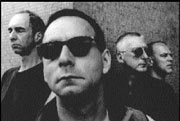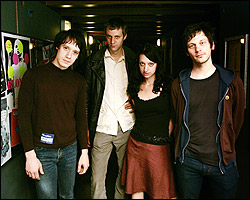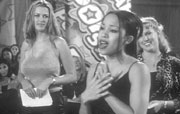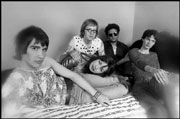WIRE
HOT HOT HEAT
Showbox, 628-3151 , $20/$15 adv.
8 p.m. Tue., Sept. 10
Ask any die-hard Wire fan as to the band’s peak period, and most will point to the group’s late-’70s punk era troika—Pink Flag, Chairs Missing, 154.
But put the same question to Wire singer Colin Newman, and he’ll give you a much broader view of the group’s multidecade run. Though he’ll readily admit the band’s disco/dance-centric ’80s output is “patchy at best,” don’t expect him to apologize for experimenting.
“Product consistency’ is essential in toothpaste and cheese; it’s irrelevant in art,” quips Newman. “[What] Wire does references a lot of stuff and should always be seen within the context in which it was created. Wire always reflects its times.”
So what then does Wire’s new EP, Read & Burn 01, say about these times? Newman notes that the disc first took shape at a 2000 reunion concert at London’s Royal Festival. During the show, which found the group reworking and reshaping their back catalog into what Newman describes as a “historical item,” the members of Wire felt a notable difference in the crowd’s reaction to certain songs.
“When we went fast, it created a special frisson in the audience,” recalls Newman.
Newman says he felt the musical climate shifting at the festival that night. Later, he says, when bands like the Strokes broke in the U.K., it came as no surprise. For his part, Newman quickly became possessed with creating new Wire songs that could converse with these new (old) sounds. For the first time in 10 years, the band realized they had something they needed to say.
Conceived as an ongoing set of releases to be sold only through mail order and at shows, the Read & Burn series is overtly designed to reflect—in fun-house mirror fashion—the current state of rock music. Abrasive, angry, and aggressive, Wire’s comeback EP is six songs of post-everything. Imagine an apocalyptic end to metal, emo, and punk—and then imagine Wire charged with rebuilding it all. Though the new tracks retain elements of the group’s signature minimalism and deceptive simplicity, there’s no room for misinterpreting the material as revisionist.
“The choice of the aesthetic of 01 is quite deliberate. It’s ‘2002 shouty rock,'” reports Newman, referring first to the songs on the first Read & Burn, and the current explosion of ultracathartic pop/punk.
But it’s not just that the sounds on this new release mirror the current postmillennial meltdown; Wire’s determined, D.I.Y. effort to circumvent record stores and ditch potential label hassles is a timely comment on the state of digital music, artist’s rights, and industry folly.
“I’d advise fans to buy the R & B‘s because they are the direct output,” he says. “Think [about] techno white labels of the late ’80s/early ’90s. Some, but definitely not all, of the material will get compiled onto ‘albums’ to be put into distribution—but not yet. Who knows how many R & B‘s there will be—I guess until we get bored with the concept.”
Quick on its predecessor’s heels, Read & Burn 02 is complete and will be available for fans on the band’s current tour. “The aesthetic of 02 is a development from 01—in some ways, it is more intense, in some ways, less. There are more colors in the box but no pastels,” says the group’s chief painter.
Not that any knowledgeable Wire fan would go looking for pale yellows and bland baby blues—regardless of genre shifts or manifesto revisions, the band has always made music that bursts brightly in the face of conventional songwriting.
“I hate all the connotations of the term ‘song,’actually. For me, all art is about editing. All the Wire material is made out of bits. There is no songwriting at all,” says Newman. “I’m as good at playing the guitar as I was when I was 17 and never play it unless I have to because it hurts my fingers. To be quite honest, I’m not at all interested in being a musician.”
It seems a strange comment from someone who’s been making music for 30 years, and whose influence can be heard so strongly in new bands like Erase Errata and Liars. But for Newman, being a musician and making music are two different things. The one constant throughout Wire’s on-again, off-again career has been that music is more than just sound. Music is art.
And besides, as Newman puts it, “It’s my job to know what is cool.”









